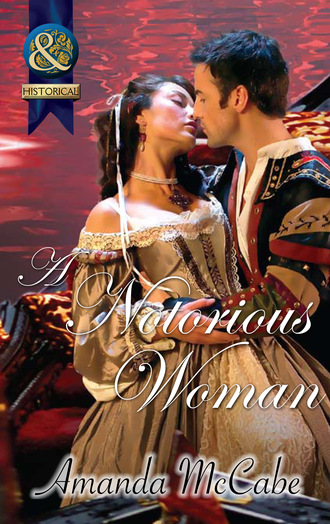
Полная версия
A Notorious Woman
But those eyes—those inhuman, all-seeing eyes. They watched her steadily, not even startled, and she was captured by their sea-like depths.
Only for an instant, one quicksilver flash, but it was enough to lose her the advantage. Nicolai seized her wrist in a bruising grip, tightening until her wrist bone creaked and she cried out. Her fingers opened convulsively, and the dagger clattered to the floor. He swung her beneath him, pinning her to the bed. No lazy, debauched, lustful actor now, but a swift, pitiless predator. Just as she was.
Marguerite was well trained in swordplay and the use of daggers and bows, in courtly fencing and rough street brawling. She knew tricks and dupes to compensate for her small size and feminine weakness. Yet she also knew when she was truly defeated, and that was now. She knew what it was she saw in those eyes. It was doom.
As she stared up at him now, she felt strangely calm, as if she was already hovering above her body, watching the scene from the rafters. Her victim became her murderer, and it was no less than she deserved for her sins. This day had been long in coming. If only she could not die unshriven! She would never meet her mother in heaven now.
But she did see her avenging angel, rising above her in the darkness. He scooped up her dagger, examining the blade while he held her firmly down with his other hand, his strong body. She felt the full force of that lean strength; the smooth, supple muscles that held him on a tightrope or in a backflip now held her easily in place.
He stared at the dagger, so thin and perfectly balanced. So lethal. The small emerald embedded in the hilt gleamed. “Why me?” he said roughly. “Why try to kill a poor actor?”
“You are not a poor actor, Monsieur Ostrovsky, and we both know it,” she said in French. “You have secrets to equal my own.”
“What are your secrets, mademoiselle?” he answered in the same language.
Marguerite laughed bitterly. “It hardly matters. I have failed in my task, but I take my secrets to the grave.”
“Do you, indeed? Well, that might be a long time from now, mademoiselle. I have the feeling that fairies, like cats, have many lives. You are young; I’m sure you have some to go.”
Marguerite stared up at him, baffled, but his face gave nothing away. He was as beautiful, as cold, as the marble statues in the piazza. Her passionate lover was gone. “What do you mean?”
“I mean, mademoiselle whatever-your-name-is, that this is not your night to die. Nor mine, though you would have had it otherwise.” The dagger arced down, but not into her heart. It sliced into her skirt, cutting away thick strips of silk. Holding the blade between his teeth like a corsair, he bound her hands and feet tightly, with expert knots.
“What are you doing?” Marguerite cried, bewildered. This was not how the game was meant to be played! “I would have killed you! Do you mean you won’t kill me? You won’t take your revenge?”
“Oh, I will take my revenge, mademoiselle, but not on this night.” He tied off the final knot around her wrists, so firm she could not even wriggle her fingers. “It will be some day when you least expect it.”
Once she was trussed up like a banquet goose, he leaned down and pressed one gentle kiss to her lips. He still tasted of herbs, ale and her own waxen rouge. And he still smelled of an alluring summer day. Quel con!
“I just can’t bring myself to destroy such rare beauty,” he whispered. “Not after your fine services, incomplete though they were. Adieu, mademoiselle—for now.”
He tied the last strip of silk over her mouth, and opened the very window Marguerite had planned for her escape. As she stared, infuriated, he gave her a wink, and with one graceful movement leaped through the casement and was gone.
Marguerite screamed through her gag. She arched her back and kicked her legs, all to no avail. She was bound fast, caught in her own scheme. And the cochon didn’t even have the decency to kill her! To follow the code all spies and assassins adhered to. At least French ones.
“Have his revenge,” would he, the beautiful, arrogant Russian pig? Never! She would find him first, and finish this task, no matter what. No matter how far she had to go, even to the frozen wastes of his Russia itself.
For the Emerald Lily never failed.
Chapter One
Venice—1525
Oh, yes. He was really dead.
“Madre de dio,” Julietta Bassano whispered, leaning close to examine the man’s corpse, sprawled across the rich silk cushions of his gilded bed. It had not been an easy death, nor a pretty one. His face, so florid in life, was turned a dark, mottled purple-blue, his black beard matted with bile and spittle and blood. The wide, staring, sightless eyes were dotted with tiny spots of red, and his stiffening limbs were thrown wide in abruptly frozen death throes.
No—not an easy demise at all. She recognised the signs. She had seen them in her own husband three years ago, as he collapsed in the middle of their own bed, convulsing and heaving.
“Witch!” he had screamed. “Sorceress! You have murdered me.” And his clawlike hands had snatched at her gown, his blood and vomit spraying her flesh with death.
No! she thought sternly, closing her eyes and her mind to the memories. Giovanni was long dead; he had deserved his end, the pig. He could not hurt anyone ever again.
Unlike this man…
Julietta opened her eyes to stare down at the corpse of Michelotto Landucci, noble of the Most Serene Republic, high member of the Savio ai Cerimoniali. His richly brocaded robe hung open, revealing a heavy, hairy stomach, a flaccid, blue-tinged member. With a snort of disgust, she grabbed the edge of a silk sheet and drew it up over him, hiding him from view.
Behind her, she heard a soft, frightened sob, a stifled gasp. Julietta tried to take in a deep, steadying breath to calm herself, but the stench of death had grown too strong. It stuck in her nostrils, clung to her hair and cloak. Clasping the black velvet closer about her throat, she spun around to face the woman who huddled in the shadows of the palatial bedchamber. Cosima Landucci, wife—nay, widow—of the man beneath the sheet. Unlike her spouse, she was still fully dressed in an elaborate gown of gold-embroidered blue silk. Thick, dark red hair spilled down her back and fell over her white, unlined brow, proclaiming how very much younger than her husband she was. Just a child, really.
A child whose husband lay poisoned in his own bed. Well, well. She would not have thought it of timid little Cosima. People were surprising. Ever surprising.
“What happened here, signora?” Julietta asked, as gently as she could. She knew this girl—Cosima had been a loyal patroness of Julietta’s perfume shop for almost two years, coming in weekly to buy her special scent, jasmine and lily, and to talk to Julietta. And talk, and talk, as if she had no other friend in the world but her perfumer. And Julietta had been glad to listen. She felt sorry for the girl, who seemed so lost and unhappy despite her fine gowns and flashing jewels. She—well, she rather reminded Julietta of herself so long ago, when all her dreams of marriage and family were shattered in the face of cold reality.
But this—this was something else altogether.
“Well, signora?” Julietta prompted, when the girl just went on sniffling.
Cosima pressed a lace handkerchief to her face, her hands shaking. “I—I do not know what happened, Signora Bassano!”
“You were not here? You simply came in to find your husband dead?” Julietta gave a pointed glance at the dainty slippers and jewelled headdress discarded on the lavish Turkish rug.
Cosima followed her gaze and shook her head, the waves of red hair spilling over her shoulders. “No, I was here. We had just returned from a supper party, and he—he…” Her soft, little-girl voice faltered.
“Requested his conjugal rights?”
Cosima slowly nodded.
“Hmm,” Julietta continued. “What else did he do?”
“D-do?”
Julietta suppressed an impatient sigh. Dio mio, but they did not have all night! Already it grew very late, and the Landucci household would be up and about in only a few hours. Julietta wanted only to discover what this girl wanted of her, why she had summoned her here, and then be on her way. She had her own business to attend to, business of far more import than a silly patrician woman and a dead husband who no doubt greatly deserved to be dead.
What was the point of this whole exercise?
Yet she knew she could not rush Cosima, or the girl would collapse entirely. Already she was trembling like a winter leaf in the cold wind.
“What did he do before he demanded to bed you? For you are still dressed, madonna.” Julietta gestured towards Cosima’s gown, the sleeves still neatly tied in place, the gold lace on the high-waisted bodice smooth.
Cosima bunched the handkerchief in her fist. Her eyes were red-rimmed, her skin chalk-white. “He drank some wine, as he always does before—before…Quite a lot of it.”
Julietta frowned. There were no goblets or ewers around the chamber. Cosima’s tearful gaze flickered to the floor, and that was where Julietta saw it—the jewelled stem of a silver goblet, barely glimmering under the edge of the bed. She knelt down and drew it from beneath the heavy fall of velvet bedclothes.
In the very bottom of the cup rested the dregs of dark red wine, stagnant as blood, already drying at the edges. Julietta lifted it to her nose and sniffed cautiously. A faint hint of some green, grassy scent met her sensitive nose, along with the sweet headiness of the expensive wine. And something else. Jasmine and lily—Cosima’s own perfume, mixed by Julietta’s own hand and poured weekly into Cosima’s vial of blue Murano glass.
Julietta set the goblet aside and peered once more into the black depths under the bed. Her nose wrinkled at the copious amount of dust—the maidservants were obviously not as diligent as they should be. Yet there was more than dust and dirt. There was the faint sheen of celestial blue glass.
She snatched it up, holding it to the light. The vial was empty, the silver stopper gone, but the scent of jasmine and lily still clung about it. Along with that strange touch of green grassiness.
It was a scent Julietta was all too familiar with.
“Poison,” she whispered. It echoed in the vast chamber like a death knell.
“No!” Cosima shrieked. She dashed across the room, throwing herself to her knees beside Julietta. She clutched at Julietta’s arm, her pretty face a rictus of despair and terror. “He cannot have been poisoned, and if he was I did not do it. Please, Signora Bassano, you must believe me!”
Julietta resisted the urge to shake off the girl’s clinging hands, and instead held out the empty vial. “If you did not, madonna, then someone is at great pains to make it seem as if you did.”
Cosima stared at the blue glass with wide, horrified eyes. “No. I did not—did not love my husband as a good wife should, you know that, signora. But I am a good Catholic! I would never imperil my mortal soul by…” Her expression crumpled, and she was in tears again.
“Basta!” Julietta seized the girl’s arm and gave her a shake. “No time for that now. Your servants will be up soon, and we have much to do.”
Cosima sniffled, and looked up at Julietta with hope writ large on her face. “You will help me?”
Julietta stared at Cosima, once again seeing herself as she once was. Young, alone, afraid. So very afraid. And with good reason. She wanted more than anything to walk away, to flee this cursed house and this troublesome girl. Yet she could not.
“I will help you,” she said shortly. “But you must do everything I say, and quickly.”
Cosima nodded eagerly. “Of course, signora! I will do whatever you say, if you will just help me again.”
“Call my maidservant, Bianca, she waits in the corridor. The two of you must build a fire in the grate, a large one, as hot as possible.”
Cosima nodded and scrambled to her feet, scurrying out the chamber door in silence, tears apparently forgotten. At least the girl could move fast when need be.
When Cosima was gone, Julietta also stood and went to the window. No one was about so late at night, not even a boatman or street prostitute. The Feast of the Ascension, when Carnival would officially commence, was still days away. She pushed open the casement and stared down at the canal two stories below. The blue-black water was calm, barely lapping at the base of the palazzo in tiny, white breaking waves. The water knew how to keep its secrets—always. Julietta took the goblet and the vial and tossed them out as far as she could.
For an instant, the fading moonlight caught on the tainted objects, sparkling and dancing. Then they were gone, vanished with the merest splash as if they had never been.
“Madre de dio,” she whispered, “do not let it begin again.”
The sky was tinged the merest pale gray when Julietta finally made her way home from the Palazzo Landucci, Bianca trailing behind her as they slipped through the narrow calli back to their dwelling north of the Rialto. Julietta ached with exhaustion, every nerve crying out for rest, sleep, blessed forgetfulness. She would not sleep this morn, though, she knew that well, nor for many nights to come.
Not after all she had done.
The only sounds were the click of their shoes against the cobblestones, the creak of loose shutters in the cold breeze. No one was yet about, not even the vendors setting up their wares on the Rialto and in the fish market. The air was chilly, thick with mist and the sticky-sweet smells of the water. The pastel colours of the stucco houses, all pink and yellow and orange in the sunlight, were gray and white as the stars blinked off above them and the moon faded.
Julietta drew deeper into her cloak, pulling the hood closer about her face, hurrying her steps towards home and the illusion of safety.
“Signora…” Bianca began, drawing up beside Julietta in a rush of pattering steps. She sounded out of breath at their pace.
“Not here, Bianca,” Julietta murmured. “’Tis not safe.”
They turned into a narrow passageway which led to their own campi, a small, well-kept square with a large marble fountain in the centre, where all the residents could gather fresh water. A few nights more and that fountain would run with wine for the pleasure of throngs of costumed revellers.
As the bells of the church of San Felice tolled the hour, Julietta skirted around the fountain, pulling a key out of her cloak’s secret pocket. At the blue-painted door of the dwelling that served as both shop and residence, she lifted the key towards the brass lock.
A sharp, clanging noise behind her stilled her hand, and she whipped around, every muscle tense and poised for action. Her hand flew to her side, where a serviceable dagger rested in her sash. Her gaze darted around the campi, from corner to corner, searching out any hint of danger.
Were they followed? She felt as if someone watched her, their stare like pinpoints of fire on her skin.
Yet there was nothing to be seen. Her neighbours’ dwellings were all silent. As she watched, a cat streaked past the fountain, the only sign of any life.
Bianca let out an audible squeak of relief. “Only a cat, madonna,” she whispered.
“Sì,” Julietta answered, unconvinced. Yet, still, there was nothing to be seen. They were, to all appearances, alone. “We should get inside.” She turned back to the door, and, as swiftly as she could move her trembling hands, opened the lock and ushered Bianca inside the dim dwelling.
Only once the solid wooden panels were closed and locked behind them could she draw a breath again.
Safe. For now.
Chapter Two
So. That was the famous Julietta Bassano.
Marc Antonio Velazquez stayed in his hiding place in the narrow space between two tall houses for a long time after Signora Bassano slipped into her home and out of sight. He watched as a faint golden glow of light appeared in the window of the first floor, the floor where her perfume shop did business. Watched as the light faded, only to reappear above, a welcoming beacon in the mist-shrouded chill of a Venetian winter morning.
She was not what he had expected. He had expected beauty, of course, beauty of the fashionable sort demanded in Venice: golden hair, azure blue eyes, rounded bosom and hips. A canvas that Florentine Botticelli brought to glorious, feminine life.
Julietta Bassano would never be mistaken for La Primavera. She was tall and very slim in the plain black-and-white gown that could be glimpsed beneath her enveloping cloak. There were no soft curves of bosom, hips and belly, as was desirable in these demanding days. There were only straight lines, long legs, narrow shoulders. The hair that escaped from her hood was black as the night around them, not the gold that ladies spent hours sitting in the sun wearing a crownless hat to achieve. He had not been able to see her face clearly, but it seemed as slim as the rest of her, a pale oval, with sharp cheekbones, sharp chin.
For all that, though, there was something—something enchanted about her. She carried mystery and sadness about her like a second velvet cloak, something palpable and so alluring.
Marc could never resist a mystery, a complication. It was his great downfall in life. Yet he would never have thought her to be Ermano’s sort of woman. There was not an ounce of giggling, golden softness about her. Just darkness, and hidden daggers.
No, not Ermano’s sort. But very much Marc’s.
Perhaps this task would be more enjoyable than he had ever anticipated. Enjoyable—until he had to destroy her. Very regrettable, indeed.
Chapter Three
Julietta set the last bottle into place on the gleaming shelf, balancing on her tiptoes atop a footstool to examine the array of sparkling glass, ethereal ivory, luminous onyx. Most of her patrons brought their own vials to be filled with their choice of scent, but a few liked to buy new containers and were willing to pay a great deal for the finest quality. This shipment, newly arrived from France, should do very nicely.
Julietta tilted her head to one side. “What do you think, Bianca?” she said. “Is the display enticing enough?”
Bianca left off polishing the long marble counter and came to scrutinise the sparkling bottles. She was typical of her people, the Turkish nomads, small, thin, dark, barely coming up to Julietta’s waist when she perched on the footstool as now. But she had been as steadfast a friend as Julietta could wish for, ever since those bleak days when she fled Milan for the masks of Venice.
“Very fine, madonna,” Bianca pronounced with a grin, reaching up to flick her rag at the shelf. “And certain to bring us a very handsome profit, now that they have arrived at long last.”
“Sì, now that the Barbary pirates are driven away,” Julietta answered. The pirates had plagued Venetian shipping for many months earlier in the year, harrying the trade convoys with their shipments of spices, silks, wine, sugar—and jewelled perfume vials. Julietta had missed her lavender from France, her white roses from England and the more exotic blooms and spices from Egypt and Spain. Then, the pirates were destroyed, in a tale so filled with adventure and danger it stirred even Julietta’s rusty, unpoetic soul. The salas of Venice were buzzing with nothing but stories of Il leone, the brave sea captain who destroyed the wicked pirates and saved the sacred shipping of La Serenissima. Bianca herself, after seeing his triumphant arrival in Venice last week, had talked of nothing else.
“If I was a skilled poet, Bianca, I would write an epic about Il leone,” Julietta said lightly. She stepped down from the stool, brushing her hands on the linen apron covering her black-and-white gown. “It would make us a great fortune. Troubadors would vie to recite it, to set it to music and to play it in all the great salas!”
“You have a fortune, madonna,” Bianca protested. Though she laughed, her dark, round little face wrinkled in puzzlement. And well might she be puzzled—Julietta rarely succumbed to whimsy at all, she was far too busy, far too cautious for that. After the night they had just passed at Palazzo Landucci, whimsy seemed even further away than usual.
Yet somehow—ah, somehow the daylight made things seem rather different. Even the city, so deserted, so haunted in the mists before dawn, was transformed by the pale winter sunlight, by thoughts of dashing sea captains and wicked pirates. In the small campi, people hurried by, intent on their morning errands. Laughter and jests rang out, blending with the everpresent bells of San Felice. Soon, very soon, it would be Carnival, the most profitable time of year for the shop. And, early that morning, after a mere two hours of fitful sleep, she had heard mass at San Felice, asking absolution of the night’s sins.
If only absolution could mean perpetual concealment, as well. And if only Count Ermano did not make an appearance today. She had had quite enough of drama and danger without the count’s ever-pressing attentions.
“You are right, Bianca,” she said. “We do have a fortune, so the world will never be inflicted with my poor poetic skills. I must still be giddy from lack of sleep.”
Bianca nodded slowly. “Of course, madonna. You should rest, go back to your bed for a few hours.”
“No, no. It is almost time for us to open. Perhaps I will have a siesta at midday. Now, would you fetch some of the essence of chamomile from the storeroom? I will finish mixing Signora Mercanti’s tincture.”
Bianca nodded and hurried away, her brightly striped skirts swishing over the freshly swept tile floor. As the store-room door clicked shut behind her, Julietta went back to tidying before they opened.
There was not a great deal to do—the shop was always kept immaculate, for fear dust or dirt could contaminate the sweet wares, wares Julietta spent hours blending and preparing. Every vial, every jar and pot and amphora, contained the toil of her own hands, the products of her own careful study. And the ladies of Venice, courtesan and patrician wife alike, flocked to buy them, to beg her to mix a magical scent for them alone.
Julietta stepped away from the counter, her back to the blue-painted door as she examined her little kingdom. It was small, true, yet it was all her own, from the mosaic tiles of the floor to the white plastered ceiling. It was the only thing she had ever had for herself, the only thing she had ever loved. And the small room, hidden in the corner behind its secret panel—that was most especially hers.
She reached out for a small bottle on the counter, a blue glass vial studded with silver and tiny sapphires that had strayed from one of her careful displays. She held it to her nose and smelled jasmine and lily.
Jasmine and lily. Hurriedly, she replaced the bottle, which was meant for Cosima Landucci, back on the counter, but the heady sweetness of it clung to her fingers, reminding her of her night’s work. As she stepped back, she caught a glimpse of herself in the gilt-framed mirror hung behind the counter. Her hair was still neatly braided and coiled about her head, covered by a black lace veil. Her black-and-white gown, touched only by a hint of scarlet in the ribbons of her sleeves, was as neat and quietly elegant as ever after she removed her apron. But her face—her face was as pale as a phantom.
Or a witch.












